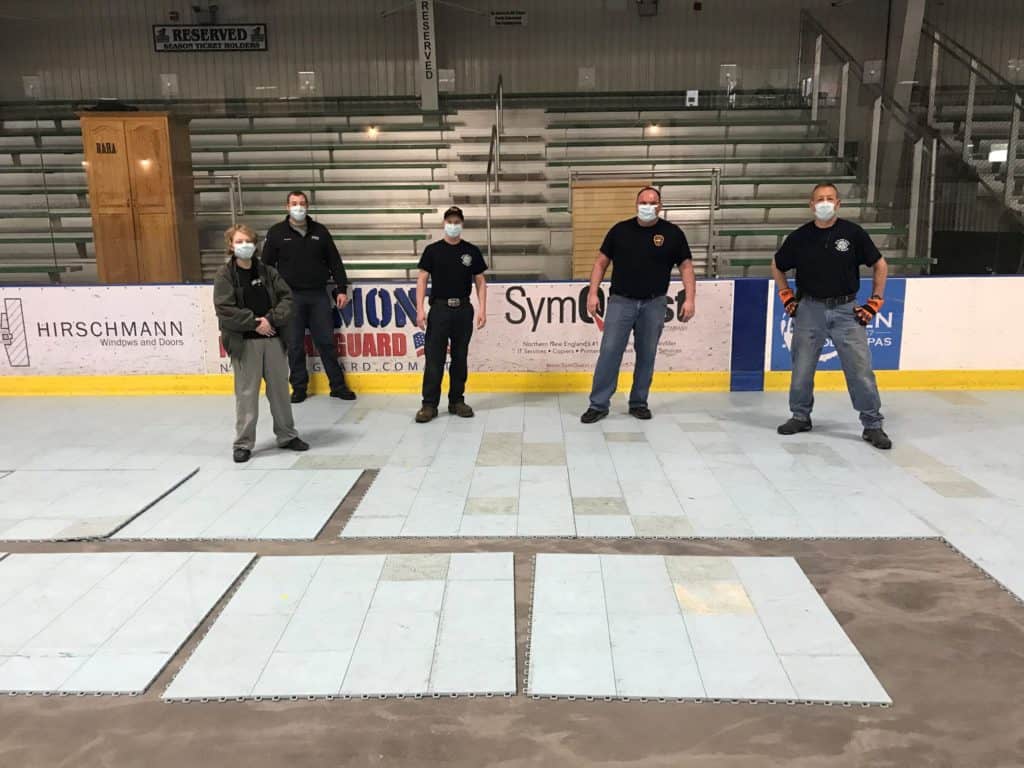
CEO says “ok for now” on PPE
By Polly Mikula
On April 2, Governor Phil Scott announced new steps in the state’s plan to prepare for a surge in COVID-19 cases, and in turn, the need for additional hospital and medical capacity.
“We continue to expand our medical surge capacity to be prepared for what could be a significant increase in medical need in our state in the coming weeks,” said Governor Scott in a news release April 2. “While we hope we will not need this extra capacity, our modeling indicates we must be prepared for a significant surge in medical care to treat COVID-19 patients. We are taking these steps to ensure we are as prepared as possible for what could come.”
The plan will add 950 additional beds, at surge sites, to the 662 currently available beds throughout the state. Rutland Regional Medical Center will contribute 150 of those and the site is being constructed at Spartan Arena.
“Rutland is proud to support these efforts to address increased medical need due to COVID-19,” said Claudio Fort, president and chief executive officer of Rutland Regional Medical Center. “Our teams are working closely with all of our health care partners to protect our staff and keep our communities safe.”
Firefighters from City of Rutland Fire Department and Rutland Town Fire Department laid down the floor at Spartan Arena on Sunday. The arena will be converted to the surge site, for alternate care for Rutland Regional in the event of an overflow of COVID-19 patients.
“It takes a community, and we thank these first responders for stepping up and ‘stomping’ that floor,” RRMC wrote on its Facebook page, Sunday, April 5.
Before RRMC moves to utilize the Spartan Area surge location, it will first open up other areas of the hospital, “once we exceeded the capacity within the hospital we’ll move to alternative care sites outside the hospital,” said Fort.
RRMC, like most hospitals across the country, has postponed all unnecessary procedures. It also is collaborating with health clinics and outside health organizations. For example, it has an agreement with the Vermont Orthopedic Center to take patients that are injured (not sick with COVID-19).
If someone came to the emergency department with an injury, like broken bones, “We would evaluate them to make sure they are stable then take them over to the orthopedic clinic which is now staffed to handle those patience,” said Tom Rounds, RN and director of the RRMC Emergency Department, during an interview with Tom Donahue of BROC on PEGTV April 2. “That allows for more room in the ED for COVID patients, so that collaboration will make a big difference.”
When the hospital converts a section, wing or floor, to handle more COVID-19 patients, it converts the space to be a “negative pressure area,” explained Rounds. To create a negative pressure area “machines draw down the pressure in that space and exhaust it out of the building,” he said, which helps protect the other patients and the staff from airborne pathogens and helps to reduce the spread of the virus.
PPE
When asked how RRMC was with personal protective equipment (PPE), Fort said: “We are ok right now, the problem is we don’t know how big this fight is going to be and how long this duration is going to be, so here at Rutland Regional Medical center we’ve put in place some conservation measures and these are changing rapidly. The National Center for Disease control has changed their recommendations for this to allow us to safely reuse these masks,” he said. “What we want to be sure of is that we don’t run out of this critical PPE when, in three or four weeks we project to be at the top of the curve and we have a high number of infectious and very sick people, that is when our staff is going to need them most.”
Testing
On Monday, April 6, RRMC set up a tent outside that is now able to screen patience in a “split flow,” said Rounds. “We’ve opened up our ambulance bay… and turned it into a respiratory evaluation unit,” he said. “We have the ability to do chest x-rays there, screen patients, provide care and some patients might be able to receive treatment right there without ever having to come into the core of the emergency department.”
RRMC also has a tent set up at the Allen Street entrance where people who have had a test ordered by a primary care doctor (who confirmed the likelihood of their symptoms being COVID-19) can simply drive up and get tested. “They don’t have to exit their car, we’re collecting the specimen and those specimens are sent off to the Mayo clinic,” Rounds said. If someone is sick in the hospital (as an in-patient or a healthcare worker) their tests are shuttled to Dartmouth three times per day “so we can turn those results around quicker,” Rounds explained.
Testing is now available for all people experiencing symptoms, but you do still need to get a doctor’s referral, you can’t just drive up to be tested, Rounds emphasized.
“Everything we’re doing is to ensure that the hospital is there for you when you need it, so if you are having an medical emergency you should call 911 or come to the ER,” Ford added.




